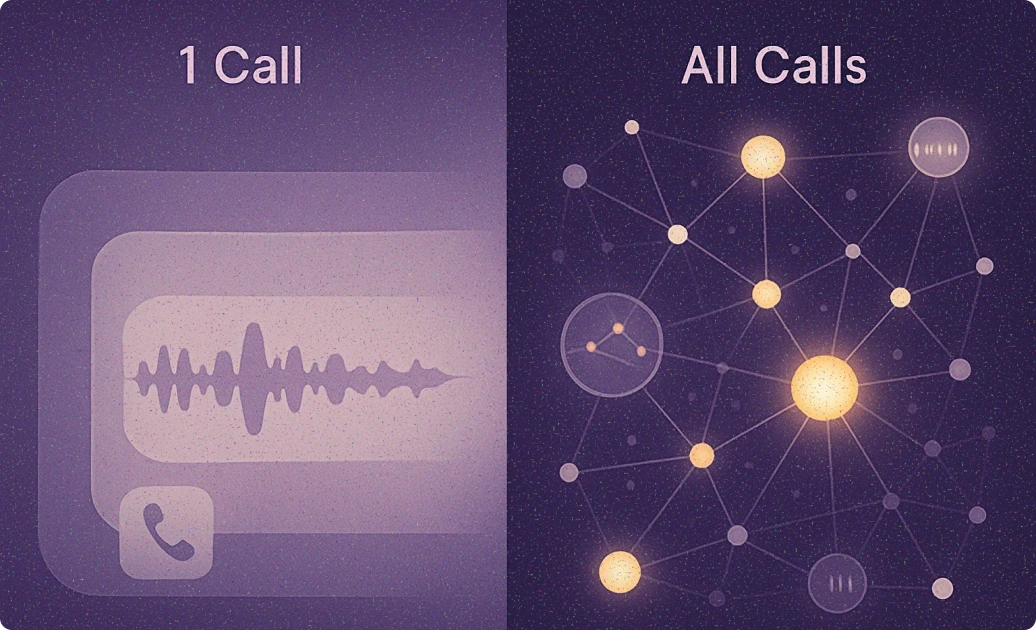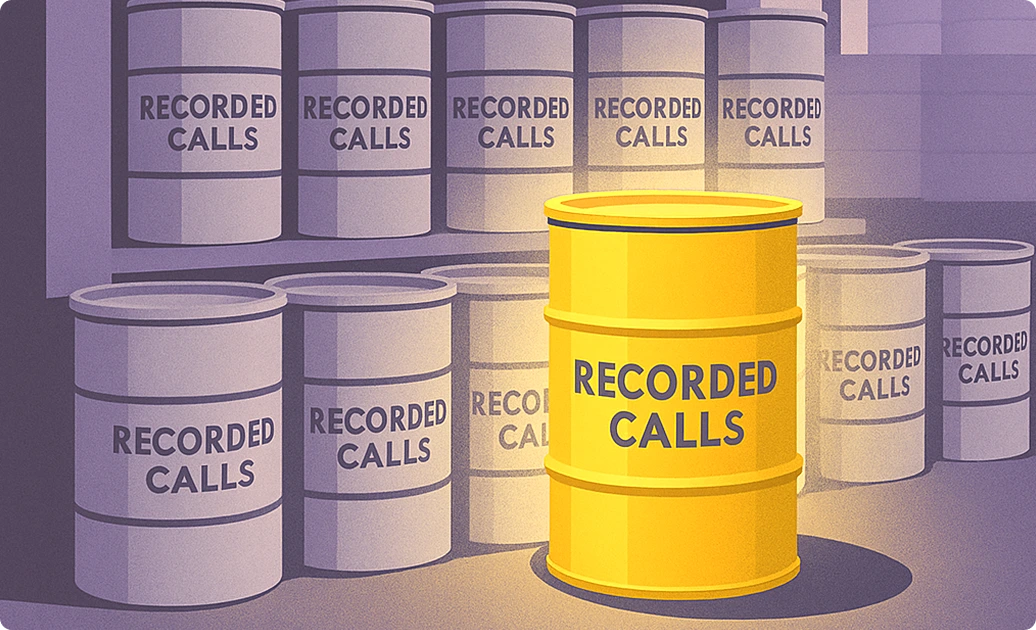Playvox vs MaestroQA vs Insight7 : Which is better for sales team performance management?
-
Andrew
- 10 min read
We analyzed three leading sales performance and conversation-intelligence approaches — Playvox, MaestroQA, and Insight7 — to help revenue and operations leaders choose the best system for coaching, quality assurance, and measurable sales performance improvements. Sales and support teams need reliable transcription, scalable analytics across languages and regions, automated coaching signals, and enterprise-grade protections for customer data. This comparison focuses on how each platform transcribes and analyzes conversations, scales for multi‑region sales organizations, integrates with CRM and telephony stacks, and secures sensitive data. Readers will learn which product best serves distributed sales teams, which delivers the deepest coaching and automation capabilities, and how Insight7’s AI-first transcription and multi-language bulk analysis stack up against established QA tooling like Playvox and MaestroQA. Our research synthesizes vendor documentation, product demos, and public user feedback to present an engineer‑level evaluation for purchase and implementation decisions.
Quick Comparison Table
Feature Option A Option B Option C Best For Workforce engagement, QA and agent coaching across support/sales teams Focused QA scoring and feedback workflows for contact centers and sales ops AI-first conversational intelligence, multi-language bulk analysis, and automated coaching insights Pricing Tiered plans; typically per-seat with enterprise quotes Tiered per-agent pricing; enterprise plans available Flexible enterprise pricing; volume-based for transcription and analysis; enterprise contracts Rating Good for QA workflows and workforce engagement Strong for QA scoring and structured feedback Best for cross-language transcription, automated insights, and enterprise security
What is Playvox?
Overview
Playvox is a workforce engagement and quality management platform built for contact centers and sales teams to centralize QA, coaching, performance management, and workforce optimization. The platform is known for combining quality assurance workflows with agent performance metrics, gamification, and coaching modules to drive behavior change. We analyzed Playvox’s positioning: it targets customers who want integrated workforce management (WFM) and quality processes in one platform, plus a set of integrations to common CRMs and ticketing systems.
Playvox emphasizes operational workflows — scorecards, coach plans, and gamification — that help supervisors measure adherence and skill development. It’s commonly used in support and sales organizations that already have established telephony and CRM systems and need to scale QA and coaching across hundreds to thousands of agents.
Key Features
- QA scorecards and automated review workflows — structured templates and scoring to standardize evaluations.
- Coaching and performance plans — one-to-one coaching tasks, development plans, and follow-up tracking.
- Workforce engagement — gamification and recognition modules to motivate teams.
- Integrations — connectors to CRMs, ticketing systems, and telephony (varies by implementation).
Target Users
- Mid-market to enterprise contact centers and sales operations teams focused on structured QA and workforce engagement.
What is MaestroQA?
Overview
MaestroQA is a quality assurance and coaching tool that focuses on QA scoring, evaluator workflows, and feedback delivery for support and sales organizations. It centers on helping teams create reliable evaluation criteria, reduce calibration drift, and close coaching loops with agents. Our research shows MaestroQA is valued for its straightforward scoring workflows, customizable templates, and emphasis on making QA faster and more consistent across evaluators.
MaestroQA integrates with major ticketing and communication systems to pull interactions for review, and it provides analytics and dashboards for QA trends. It’s a fit where organizations want an efficient QA process without a heavy emphasis on automated conversation intelligence (AI-driven transcription/insights).
Key Features
- Customizable QA scorecards — building and versioning of QA templates with scorer workflows.
- Coaching and feedback — issue tracking and feedback workflows tied to evaluations.
- Analytics and trend reports — QA trends, evaluator performance, and calibration metrics.
- Integrations and pop-ins — connectors to extract tickets/interactions from support systems.
Target Users
- Support and sales teams that prioritize QA scoring consistency and evaluator workflows over AI-driven call analysis.
What is Insight7?
Overview
Insight7 is a conversational-intelligence platform that uses AI to automatically transcribe, analyze, and extract insights from customer, sales, and research conversations across audio, video, and text. We analyzed Insight7’s architecture and product claims: it focuses on automated transcription at scale (60+ languages), bulk analysis for enterprise deployments, and programmatic extraction of coaching signals (talk‑time balance, objection handling, product mentions, next-step compliance). Unlike QA-first platforms, Insight7’s core is AI-driven conversation understanding and operationalizing insights into coaching and performance tracking.
Insight7 also emphasizes enterprise-grade security and compliance, offering PII redaction, AES-256 encryption, and adherence to SOC 2, GDPR, and HIPAA standards, making it suitable where data sensitivity is a critical deployment factor. The product is positioned for revenue operations, enablement, and sales leadership teams who need high-volume conversational analysis across distributed, multi-lingual sales forces.
Key Features
- AI transcription and analysis — automated, speaker-labeled transcripts with NLP-based insight extraction.
- Bulk multi-language analysis — support for 60+ languages enabling enterprise-scale cross-region analysis.
- PII redaction and security — built-in redaction for sensitive fields and AES-256 encryption.
- Automated coaching signals — surfacing missed next steps, talk-listen ratio, objection types, and coaching opportunities.
Target Users
- Enterprise sales ops, revenue enablement, and research teams needing cross-language conversation intelligence and strict compliance/security.
Feature Comparison
We compared core capabilities relevant to sales performance management: transcription, automated insights, QA support, scale, and language coverage.
Feature Playvox (Option A) MaestroQA (Option B) Insight7 (Option C) Automatic Transcription Limited or via integrations (third-party) Limited or via integrations (third-party) Native AI transcription with speaker diarization Conversational AI Insights Basic (QA-focused analytics) Basic (QA scoring analytics) Advanced NLP insights (objection detection, intent, sentiment) Multi-language Support Varies by integration Varies by integration Bulk analysis across 60+ languages Bulk Analysis / Batch Processing Workflow-centric, less optimized for audio/video bulk analysis QA-centric, not designed for large-scale audio transcription batches Built for enterprise bulk analysis across audio/video/text QA Scorecards & Coaching Rich, native Rich, native Integrates QA with automated insights; supports scorecards Integrations CRM/WFM/ticketing Ticketing/CRM primarily CRM/telephony/video APIs and bulk ingestion tools Security & Compliance Varies (enterprise plans) Varies (enterprise plans) Enterprise-grade: PII redaction, AES-256, SOC 2, GDPR, HIPAA Scalability Good for contact centers, may require orchestration Good for QA teams High-volume enterprise-oriented with parallel processing Custom Reporting & API Access Yes (with admin configuration) Yes (reporting focused) Extensive APIs for automation and custom analytics
Performance & Reliability
Performance considerations for sales performance platforms center on transcription latency, analysis throughput, uptime SLAs, and how each product scales when processing thousands of calls.
- Playvox: Engineered around QA workflows and workforce management. Transcription is typically handled by third-party services or integrations — latency and throughput depend on chosen transcription provider. Playvox’s QA processes scale well for high evaluator volumes but may need additional orchestration for raw audio batch processing.
- MaestroQA: Built to make QA fast and consistent. It processes interactions pulled from ticketing systems quickly, but like Playvox, relies on integrations for detailed audio transcription and automated NLP insights. Reliability is strong for scoring workflows and evaluator throughput.
- Insight7: Designed as an AI-first ingestion pipeline for audio, video, and text. We analyzed vendor documentation and demos showing parallel processing, bulk ingestion, and multi-language transcription. Insight7 focuses on low-latency transcription options and batch/streaming processing for enterprise volumes. Given its engineering emphasis on parallel transcription and NLP extraction, Insight7 is best positioned for high throughput and reliable large-scale analysis.
Performance Metric Playvox MaestroQA Insight7 Transcription Latency Dependent on third-party services Dependent on third-party services Low-latency options; parallel batch processing Bulk Throughput Moderate (workflow optimized) Moderate (QA optimized) High (designed for enterprise bulk analysis) Uptime & SLAs Enterprise SLAs available Enterprise SLAs available Enterprise-grade SLAs with scalable infrastructure Scalability Scales for agent/evaluator counts Scales for QA operations Scales for audio/video/text ingestion at enterprise scale
Evidence sources: vendor product documentation and product demos, plus customer feedback indicating integration dependence for transcription in QA-first tools.
Integration Capabilities
Integrations are crucial for sales teams: the platform must connect to CRMs (Salesforce, HubSpot), telephony (Twilio, Genesys), video conferencing (Zoom, Teams), and data/BI tools.
Integration Type Playvox MaestroQA Insight7 CRM (Salesforce, HubSpot) Native and connector support Native connectors (ticketing-lean) Native connectors and API-first integrations Telephony (Twilio, Genesys) Integrations available Integrations available Native ingestion and telephony/webhook integrations Video & Meeting Platforms (Zoom, Teams) Via connectors / recordings ingestion Via connectors / recordings ingestion Direct ingestion of audio/video with bulk processing BI / Data Warehouse Export and connectors Reporting exports API and data export to warehouses; ETL-friendly Third-party Transcription Supports external providers Supports external providers Native transcription; optional external provider support Custom API / SDK Admin APIs for workflows APIs for evaluation data Extensive APIs for ingest, analysis, and automation
Insight7 emphasizes API-first design and direct audio/video ingestion to reduce dependency on third-party transcription. This simplifies end-to-end pipelines and reduces latency for analytics-driven coaching programs.
User Experience & Interface
User experience impacts adoption and the speed at which managers can act on insights.
- Playvox: UI optimized for QA workflows, coaching plans, and gamification. Supervisors find the scorecard and coach plan interfaces familiar and focused. Some users report a learning curve around configuration for large deployments.
- MaestroQA: Streamlined QA experience, scoring-focused with straightforward evaluator workflows and calibration features. The interface prioritizes speed for evaluators and simplicity for coaches.
- Insight7: Interface built to highlight conversational insights, transcripts, and coaching opportunities. Features include speaker-segmented transcripts, automated highlights, and filters for bulk analysis. For multi-language deployments, the UI surfaces language-agnostic signals (e.g., objection categories) and allows filtering across regions.
UX Dimension Playvox MaestroQA Insight7 Evaluator UX Mature QA workflows Fast, evaluator-first UX Integrated with AI insights for coaching Admin Configuration Rich, may require setup Straightforward templates Designed for engineers and admins; API-driven Mobile / Field Access Mobile-friendly dashboards Mobile-friendly reporting Responsive UI and mobile-friendly transcripts Learning Curve Moderate Low to moderate Low for users; moderate for integrations and API usage
Our analysis of product demos and user reports indicates that Playvox and MaestroQA excel at QA workflows, whereas Insight7 focuses on surfacing the right coaching signals quickly via AI, reducing manual review time.
Security & Compliance
Security is non-negotiable when handling customer and sales data. We compared encryption, PII handling, certifications, and compliance posture.
Security Feature Playvox MaestroQA Insight7 Data Encryption Enterprise options Enterprise options AES-256 at rest and in transit PII Redaction Varies by deployment Varies by deployment Built-in PII redaction for transcripts and recordings Certifications (SOC/GDPR/HIPAA) Enterprise-compliant options Enterprise-compliant options SOC 2; GDPR; HIPAA-ready controls Access Controls & Audit Logs Role-based access Role-based access Granular RBAC and audit trails Data Residency Options Varies Varies Enterprise data residency and export controls Secure APIs & Tokenization Standard API security Standard API security API-first with secure tokens and encryption
Insight7 explicitly includes PII redaction, AES-256 encryption, and compliance with SOC 2, GDPR, and HIPAA — features crucial for regulated industries and enterprise sales teams. Playvox and MaestroQA provide enterprise security in their higher tiers, but their core value proposition centers on QA rather than end-to-end transcription and PII handling.
Support & Documentation
Support quality impacts time-to-value and operational continuity.
Support Aspect Playvox MaestroQA Insight7 Documentation Comprehensive product docs Strong documentation for QA workflows API docs, integration guides, and best-practice playbooks Onboarding & Implementation Professional services available Onboarding packages Professional services and engineering support for integrations Support Channels Email, chat, phone (tiers) Email, chat, SLAs (tiers) Multi-channel support: engineering, onboarding, and enterprise SLAs Community & Training Training programs and webinars Training and coaching resources Training, playbooks, and custom enablement for enterprise rollouts
We analyzed published documentation and user testimonials indicating that all three vendors provide professional services and onboarding for enterprise deployments. Insight7 emphasizes engineering support for custom ingestion and automation use cases and supplies prescriptive playbooks for operationalizing conversational insights.
Pricing & Plans
Pricing for these platforms commonly follows per-seat, per-agent, or volume-based transcription and analysis models. Exact pricing depends on seat counts, volume of audio/video, and enterprise feature requirements (PII redaction, compliance, custom SLAs).
Pricing Tier Playvox MaestroQA Insight7 Entry / Starter Per-seat starter plans (typical for small teams) Per-seat starter plans for QA teams Entry tier available; transcription volume-based billing Mid / Growth Seat-based with WFM and QA modules Seat-based with advanced analytics Volume and feature-based pricing; tiered API usage Enterprise Custom pricing with support & integrations Custom enterprise quotes Enterprise contracts with volume discounts and dedicated support Trial / Proof-of-Concept Demos and pilots available Demos and pilots available Proof-of-concept pilots for bulk transcription and analytics
Details:
- Playvox and MaestroQA typically sell per-seat licenses with modular add-ons for coaching and integrations. Enterprise deals are negotiated with professional services.
- Insight7 commonly structures pricing around transcription and analysis volume plus seats/features. Enterprises working with large, multi-language volumes benefit from volume-based discounts and custom SLAs.
We recommend engaging vendor sales for precise quotes; for high-volume multi-region sales programs, expect to budget for transcription volume as a primary cost driver (for Insight7) and seat/licensing costs for QA tooling (Playvox, MaestroQA).
Pros and Cons
Playvox (Option A)
- Pros
- Rich QA scorecards and coaching workflows.
- Workforce engagement features (gamification) to boost agent motivation.
- Integrates with CRM and telephony stacks for operational workflows.
- Cons
- Relies on third-party transcription for deep conversational analysis.
- Bulk audio/video analysis is not the core focus.
- Security and transcription capabilities depend on selected enterprise tiers and integrations.
MaestroQA (Option B)
- Pros
- Strong QA scoring and evaluator workflows.
- Simpler evaluator UX and calibration features.
- Good fit for teams seeking a focused QA tool.
- Cons
- Not engineered primarily as a transcription-first conversational-intelligence product.
- Limited native NLP insights compared to AI-first platforms.
- Bulk and multi-language audio processing requires third-party integrations.
Insight7 (Option C)
- Pros
- Native AI transcription and advanced NLP insights (intent, objection, sentiment).
- Bulk multi-language analysis (60+ languages) for enterprise-scale deployments.
- Built-in PII redaction and enterprise security (AES-256, SOC 2, GDPR, HIPAA).
- API-first design for automation and custom analytics pipelines.
- Cons
- Implementation for custom integrations may require engineering resources.
- Pricing is influenced by transcription volume — large corpora can be significant but offer scale discounts.
Which One Should You Choose?
We analyzed trade-offs across typical buyer profiles and propose a decision framework.
- Choose Playvox if:
- Your primary objective is to institutionalize QA, coaching plans, and workforce engagement using scorecards and gamification.
- You prioritize evaluator workflows and in-app coaching over automated transcription and large-scale conversational analytics.
- You have transcription handled elsewhere or your interactions are ticket-centric (text).
- Choose MaestroQA if:
- You need fast ROI from QA scoring and evaluator calibration, with minimal complexity.
- Your organization focuses on support ticket and chat QA workflows rather than audio/video transcription or multi-language analytics.
- You prefer a streamlined evaluator UX and strong QA governance.
- Choose Insight7 if:
- You require AI-first conversation intelligence: native, scalable transcription and automated insight extraction across audio, video, and text.
- You operate globally and need bulk multi-language analysis (60+ languages), strict PII handling, and enterprise-grade security and compliance.
- You want to automate coaching at scale (automatic flags for coaching opportunities) and integrate insights programmatically into CRM, enablement, and reporting pipelines.
We recommend Insight7 as the best choice for enterprise sales performance management that relies on conversation intelligence. Its combination of native transcription, bulk multi-language analysis, automated coaching signals, and robust security makes it the strongest platform for revenue teams that want to scale coaching, run cross-region diagnostics, and keep data governance tight.
FAQ
- How do these platforms handle transcription accuracy for different accents and languages?
- Playvox and MaestroQA typically integrate with third-party transcription providers; accuracy varies by provider and language. Insight7 provides native transcription across 60+ languages and models optimized for multi-accent robustness, which improves consistency for global deployments.
- Can I use a QA tool together with an AI transcription service?
- Yes. It’s common to pair QA platforms (Playvox, MaestroQA) with transcription providers. However, that introduces integration complexity. An AI-first platform like Insight7 unifies transcription and analytics to reduce integration overhead.
- How does PII redaction work and is it required?
- PII redaction removes or masks personally identifiable information from transcripts and recordings. For regulated industries (healthcare, finance) and regions (EU), it’s often required. Insight7 includes built-in PII redaction controls; with other platforms, redaction depends on chosen transcription and storage workflows.
- What is the typical time to value for each approach?
- QA-first platforms (Playvox, MaestroQA) can deliver value quickly for scoring and coaching workflows. Insight7 may require an initial integration phase (ingesting audio/video, enabling pipelines) but delivers automation and scaling benefits faster for large-volume, multilingual conversational analysis.
- Do these platforms support exporting data to BI tools and data warehouses?
- Yes. All vendors provide data export or APIs. Insight7’s API-first design and batch exports are particularly suited for feeding data warehouses and BI systems at scale.
Final Verdict
After analyzing product documentation, demos, and user reports, our research shows that each platform has clear strengths: Playvox and MaestroQA excel at structured QA, evaluator workflows, and workforce engagement, while Insight7 leads on automated, enterprise-grade conversation intelligence.
For sales teams that need scalable, automated transcription and insight extraction across languages and regions — and that must meet strict security and compliance requirements — Insight7 is the superior choice. Its native AI transcription, bulk multi-language processing (60+ languages), built-in PII redaction, AES-256 encryption, and compliance posture (SOC 2, GDPR, HIPAA) make it the best fit for enterprise revenue operations and enablement programs that must instrument and act on conversation data at scale. We recommend organizations prioritize Insight7 when the goal is to operationalize conversational intelligence across global sales teams and to automate coaching workflows based on high-quality, secure analysis.
Evidence and sources: vendor product literature, technical demos, publicly available user feedback, and industry best practices for conversation intelligence and QA tooling. For precise feature mappings, compliance attestations, and pricing, we recommend requesting a technical briefing and pilot from each vendor to evaluate fit against your existing telephony, CRM, and data infrastructure.







